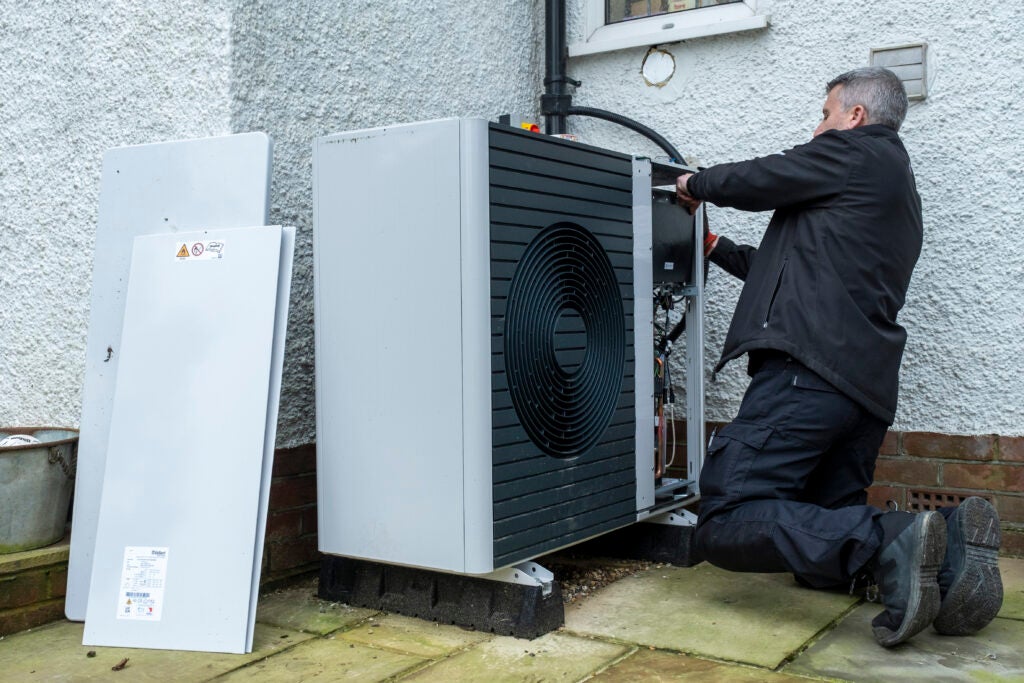France is Europe’s leading market for heat pump sales, with close to 400,000 units sold in 2020, according to Energy Monitor’s analysis of European Heat Pump Association (EHPA) data. Italy and Germany follow, with more than 230,000 and 140,000 sales, respectively.
Absolute sales volume, however, is not the only way to measure which countries are leading on heat pump installations. If we look at data for sales per thousand households, France drops to seventh out of 21 countries in the rankings, behind nations in northern Europe.

Discover B2B Marketing That Performs
Combine business intelligence and editorial excellence to reach engaged professionals across 36 leading media platforms.
“In northern Europe you have no gas grids, so people are used to getting heat with electricity, biomass or district heating," explains Thomas Nowak, the EHPA’s secretary-general. "Countries that don’t use gas for heating have a much, much higher penetration of heat pumps.
"In France," he adds, "you had acceptance of electricity as an energy carrier for heating; for other countries, that was never the case.”
Hugo Haas from L'Observatoire des Énergies Renouvelables and the EurObserv’ER consortium, which also tracks the European heat pump market, concurs. “The technology develops more easily in countries where the price of electricity vis-à-vis gas remains competitive,” he says.
Whether heat pumps manage to take off in countries where they have not yet gained a foothold is vital beyond the industry itself. Following Russia’s invasion of Ukraine, the EU released the REPowerEU plan, which aims to double annual heat pump deployment to ten million units installed in the EU over the next five years. This would save Europe 12 billion cubic metres (bcm) of the 155bcm of gas the EU imports from Russia each year.

US Tariffs are shifting - will you react or anticipate?
Don’t let policy changes catch you off guard. Stay proactive with real-time data and expert analysis.
By GlobalData
Nowak says the heat pump market can scale up in response to the renewed political push for energy efficiency. “It is a matter of time, but factories are being built as we speak," he explains. "Many manufacturers have doubled their capacity and plan to do so again in the next 18 months. Supply shortages in semiconductors and other parts are limiting growth. I see a revision of global value chains, but shortages should be overcome by 2024 and until then, market growth of about 20% per year still seems possible.”
Previous data confirms such market growth might indeed be possible. Europe registered a record year for heat pump sales in 2020, with more than 1.6 million units sold, despite the global slowdown and economic uncertainty as a result of the Covid-19 pandemic.
Haas confirms that Covid-19 did not slow down the heat pump market significantly. “The political will to develop this renewable energy technology to fight against climate change, and the advantages of reversibility [heat pumps can provide heating in winter and cooling in summer], can explain this enthusiasm,” he suggests.
Heat pumps are essentially reversible air conditioners, using electricity to extract and concentrate heat from the outdoor air, ground or water and bring it indoors. Equally, they can cool during summer. Since there is no way to know whether households use heat pumps for heating or cooling, or both, discrepancies exist in how organisations count heat pumps. The EHPA considers a unit a heat pump if it is the main heating generator in the household. This explains why, in its figures, France sold less than 400,000 heat pumps in 2020, while EurObserv’ER’s figure is closer to one million.
Keep up with Energy Monitor: Subscribe to our weekly newsletter]
Asked what more policymakers can do to accelerate the heat pump market, Nowak says: “Governments should support the transition [to heat pumps] by helping finance them through investment grants, faster depreciation, zero VAT rates for heat pumps and the backing of loans. We have all the technologies at hand to decarbonise heating and cooling. It needs social and policy innovation to make it happen and make it happen fast.”





